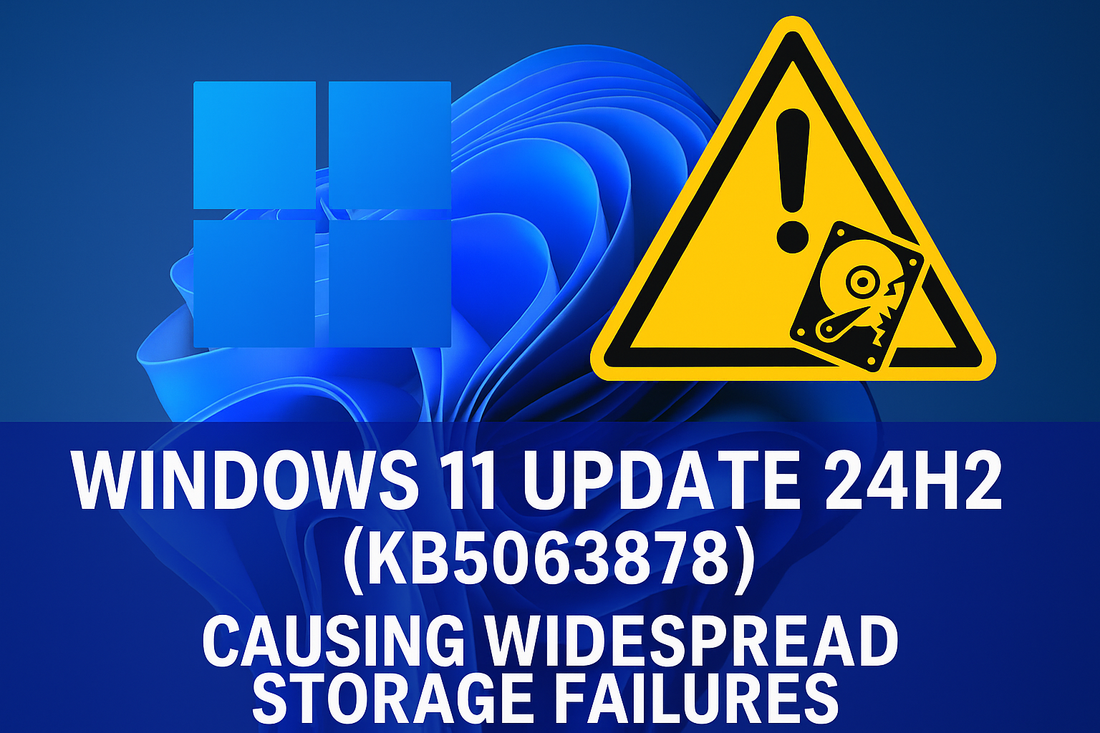Microsoft’s latest Windows 11 update, 24H2 KB5063878, is causing severe and widespread issues with storage devices. If you rely on SSDs, NVMe drives, or HDDs, you need to be aware of what’s happening, what to look for, and how to protect your data until further investigation is complete.
What We Know
-
Issue is only affecting Windows 11.
-
Windows 10, Linux, and macOS users are not affected.
-
Affected update: Windows 11, 24H2 KB5063878.
-
All storage types are vulnerable: SSD, NVMe, and HDD.
-
Both primary and secondary drives can be impacted.
-
Failures most often occur on drives over 60% full when writing 50GB+ at a time.
-
Issue is brand-agnostic (all manufacturers, all controllers).
-
Problem appears worldwide, with no regional limits.
- Phison, Microsoft, and industry partners are actively investigating.
Symptoms and Possible Issues
If you’ve installed this update, look for the following red flags:
-
Drives “go missing” (disappear from BIOS or as a bootable device).
-
File Explorer hangs or crashes.
-
SMART data becomes unreadable.
-
I/O errors appear unexpectedly.
-
BitLocker recovery screen triggers—even if BitLocker was never set up.
-
In severe cases, drives become completely unreadable and unrecoverable.
-
Resetting the PC may temporarily restore the drive, but repeating this process can lead to permanent hardware failure.
This is affecting both personal and enterprise systems.
What You Can Do Right Now
-
Uninstall the Update
-
We’ve released a step-by-step video showing how to safely remove KB5063878.
-
We’ve released a step-by-step video showing how to safely remove KB5063878.
-
Pause Windows Updates
-
Prevent the update from reinstalling until a fix is confirmed.
-
Prevent the update from reinstalling until a fix is confirmed.
-
Protect Your Drives
-
Avoid writing large amounts of data (50GB+) to drives that are more than 60% full.
-
Avoid writing large amounts of data (50GB+) to drives that are more than 60% full.
-
Backup critical data immediately.
-
Monitor for Symptoms
-
Monitor for Symptoms
-
If your system exhibits any of the listed issues, treat it as a warning sign.
-
Report Damaged Hardware
-
Report Damaged Hardware
- If you are encountering unrecoverable or physically damaged hardware, please email us at info@cec.direct with details.
Important Notes
-
Not every system problem is related to this update. If your issues predate August 12, 2025, they are likely unrelated.
-
Repeated resets or forced reinstalls may worsen the damage.
-
Stay tuned for official fixes and further investigation results as this story develops.
Stay Updated
We will continue to monitor and share updates as Microsoft and hardware vendors investigate. Follow along here for the latest guidance.

